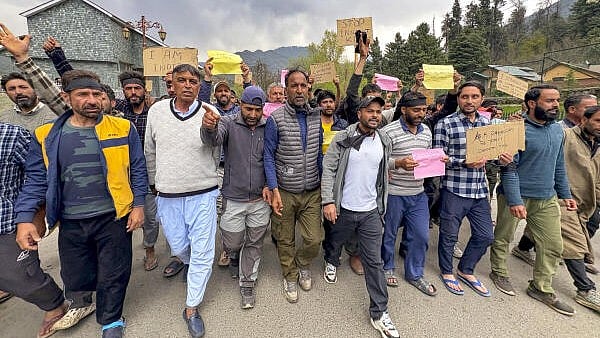
Members of the Pahalgam Taxi Owners Association protest against the Pahalgam terror attack during ‘bandh’, in Anantnag district, Jammu and Kashmir, Wednesday,
Credit: PTI Photo
Srinagar: In a rare and powerful display of unity, Kashmir on Wednesday witnessed an unprecedented shutdown and widespread protests following the horrific terror attack in Pahalgam that claimed 28 civilian lives—mostly tourists—on Tuesday.
This marked the first valley-wide shutdown against terrorism in over 35 years, with people from all walks of life taking to the streets to denounce the bloodshed.
From Srinagar to Anantnag, Shopian to Baramulla, the Valley reverberated with cries for peace and justice. Protest rallies, candlelight vigils, and silent marches unfolded throughout the day, reflecting the deep shock and anguish felt by the people.
In Srinagar, former Chief Minister and People’s Democratic Party (PDP) president Mehbooba Mufti led a poignant protest march through the heart of the city.
Holding placards reading “This is an attack on all of us,” “Stop innocent killings,” and “Killing innocents is an act of terror,” protesters rallied at Lal Chowk in a rare moment of unified civilian defiance against terrorism.
“This massacre is not just an attack on tourists, but an attack on the very soul of Kashmir. We have always stood against violence, and we will continue to raise our voice until the bloodshed ends,” Mehbooba said while addressing the protesters at city center Lal Chowk.
Similar scenes unfolded across south and north Kashmir. In Baramulla, student groups and local residents held candlelight vigils. In Ganderbal and Anantnag, shopkeepers voluntarily closed their establishments in mourning and solidarity.
“This bloodshed has to stop,” said Farooq Dar, a protester in Ganderbal. “We are peace-loving people. This violence does not represent us.”
The rare shutdown has brought together political parties, religious leaders, and civil society groups, all condemning the attack in unison. Hurriyat Conference chairman and Kashmir’s chief cleric Mirwaiz Umar Farooq also voiced his anguish. Quoting the Quran, he said, “Whoever kills an innocent soul… it is as if he had slain mankind entirely.”
Through the Mutahida Majlis Ulema (MMU), a coalition of Islamic scholars, the Mirwaiz called for a peaceful shutdown in memory of the victims and to protest what he termed as a “heinous crime against humanity.”
On social media, grief poured in from across Kashmir. A haunting image of a grieving woman sitting beside her husband’s lifeless body went viral, becoming a symbol of the shared pain of the Valley.
For the first time since the abrogation of Article 370 in August 2019, authorities allowed protest rallies to proceed peacefully. Security was tightened across key locations, though officials confirmed that the demonstrations remained largely peaceful.
“This is a collective tragedy,” said a senior official. “The public anger is real, it is justified—and today, the people of Kashmir have made it clear: they reject terror in all its forms. What they want is peace.”
The Valley, long marred by conflict, stood still not in fear, but in unified mourning and defiance—sending a powerful message that the people of Kashmir will not let terror define their land.